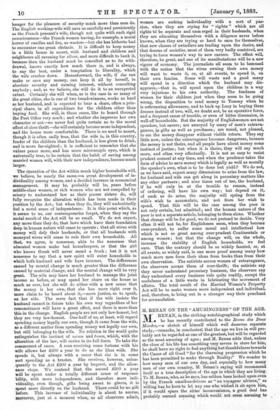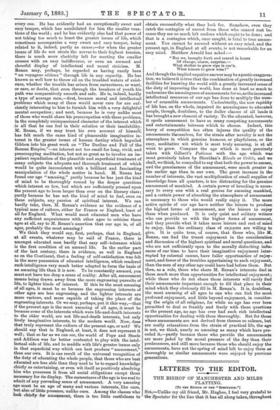M. RENAN ON THE " AMUSINGNESS " OF THE AGE.
MRENAN, in the striking autobiographical study which • be has recently contributed to the Bevue des Deux Mendes,—a sketch of himself which well deserves separate study,—remarks, in conclusion', that the age we live in will pro- bably not be regarded as one of the greatest, but will be regarded as the most amusing of ages ; and M. Renan adds that, unless the close of his life has something very severe in store for him, he shall have no right to feel anything but thankftilness towards the Cause of all Good "for the alarming progression which he has been permitted to make through Reality:" We wonder to how many men of our own day, and especially to how many men of our own country, M. Benan's saying will recommend itself as a true description of the age in which they are living. To M. Renan, who, as he says, has seldom been looked upon even by the French omnibus-drivers as "nil voyageur serieux," so willing has he been to let any one who wished it sit upon him, if it would spare the sitter inconvenience, a good deal has probably seemed amusing which would not seem amusing to every one. He has evidently had an exceptionally sweet and easy temper, which has annihilated for him the smaller vexa- tions of the world ; and he has evidently also had that power of not taking too much to heart the greater issues of life, which sometimes accompanies a very sweet and easy temper, being related to it, indeed, partly as cause ;—for when the greater issues of life do not strain the nerves to their highest tension, there is much more elasticity left for meeting the smaller crosses with an easy indifference, or even an amused and cheerful display of intellectual and moral stoicism. M. Renan may, perhaps, be regarded as having rarely been "an voyageur s6rieux " through life in any capacity. He has known so well how to throw oil on the troubled waters of exist- ence, whether the trouble has arisen from earnestness, or want, or care, or doubt, that even through the breakers of youth his path was comparatively smooth and safe. He is, indeed, hardly a type of average men,—first, because moral and intellectual problems which many of them would never care for are suf- ciently interesting to him to furnish him with a very delightful mental occupation ; and next, because he is very 'unlike most of those who would share his preoccupation with these problems, in the completely unimpassioned character of the interest which .is all that he can feel in their solution or their insolubility. M. Renan, if we may trust his own account of himself, has felt much the same kind of pleasurable imaginative in- terest in the greater issues of human destiny which beguiled Gibbon into his great work on "The Decline and Fall of the Roman Empire,"—an interest not too small for long, vivid, and preoccupying meditation, but not so great as to involve an im- patient repudiation of the plausible and superficial treatment of many subjects the adequate and thorough treatment of which would be quite inconsistent with a brilliant and fascinating manipulation of the whole matter in hand. M. Renan has found our age "amusing," partly because he has just the kind of mind to be thoroughly roused by the deeper questions which interest so few, but which are sufficiently pressed upon the present age to loom larger than ever on the literary elms; partly because he has not the kind of mind to feel, even on these subjects, any passion of spiritual interest. We can hardly take, then, M. Renan's evidence as the evidence of a typical man of culture, either for France or England, least of all for England. What would most educated men who have any sufficient acquaintance with other ages to criticise those ages at all, say to M. Renan's assertion that our age is, of all ages, probably the most amusing ?
We think they would say, first, perhaps, that in England, at all events, whatever may be said of France, there is amongst educated men hardly that easy self-tolerance which is the first condition of an amused life. In the earlier part of the last century, there is evidence, as well in England as on the Continent, that a feeling of self-satisfaction was felt in the mere possession of educated intelligence, which rendered such intelligence very much better adapted to form the basis of an amusing life than it is now. To be constantly amused, you must not have too deep a sense of reality: After all, amusement means being drawn away from the more engrossing pursuits of life, to lighter kinds of interest. If this be the most amusing of all ages, it -must be so because the engrossing interests of other ages are less engrossing, and the lighter interests are more various, and more capable of taking the place of the engrossing interests. Or we may, perhaps, put it this way,—that. if the present age is the most amusing of all ages, it must be because some of the interests which were life-and-death interests to the older world, are not life-and-death interests, but only lively imaginative interests, to the modern world. Now, does that truly represent the culture of the present age, or not? We should say that in England, at least, it does not represent it well; that so far as we can see, the world of Pope and Steele and Addison was far better contented to play with the intel- lictual side of life, and to meddle with life's greater issues only in that superficial way which can best produce "amusement," than our own. It is one result of the universal recognition of the duty of educating the whole people, that those who are best educated are less able than they used, to be to regard knowledge chiefly as entertaining, or even wit itself as positively absolving him who possesses it from all social obligations except those necessary for its display. The earnestness of the age is too real to admit of any pervading sense of amusement. A very amusing age must be an age of many and various interests, like ours, but also of little pressure, unlike ours. Among the classes who look ohiefly for amusement, there is too little restfulness to
obtain successfully what they look for. Somehow, even they catch the contagion of unrest from those who cannot rest be- cause they see so much left undone which ought to be done; and
that is a contagion which, once caught, is fatal to true amuse- ment. You cannot be amused without an easy mind, and the present age, in England at all events, is not remarkable for an easy mind. Matthew Arnold has asked :— " But we, brought forth and reared in hours Of change, alarm, surprise,— What shelter to grow ripe is our's, What leisure to grow wise F' And though the implied negative answer may be a poetic exaggera- tion, we believe it is true that the combination of greatly increased facilities for knowing the world with a greatly increased sense of the duty of improving the world, has done at least as much to undermine the amusingness of amusements for us, as the increased intellectual resources of our age has done to multiply the num- ber of accessible amusements. Undoubtedly, the new rapidity of life has, on the whole, impaired its amusingness to educated people, though, doubtless, to the duller classes of all lands it has brought a new element of variety. To the educated, however, it spoils amusement to have so many competing amusements and entertainments between which to choose. Indeed, this hurry of competition too often injures the quality of the amusements themselves, for the strain after novelty is not the atmosphere in which genuine humour, or playfulness, or the easy, meditative wit which is most truly amusing, is at all went to grow. Compare the age which is most genuinely taken with Gilbert's Patience with the age which was most genuinely taken by Sheridan's Rivals or Critic, and we shall, we think, be compelled to say that both the power to amuse, and the genuineness of the amusement, were much greater in the earlier age than in our own. The great increase in the number of interests, the vast multiplication of small supplies of knowledge from all quarters, is too distracting for the genuine amusement of mankind. A certain power of brooding is neces- sary to every one with a real genius for amusing mankind, and a certain power of absorbing the atmosphere of amusement is necessary to those who would really enjoy it. The more active spirits of our age have neither the leisure to produce the highest forms of amusement, nor the leisure to enjoy them when produced. It is only quiet and solitary writers who can provide us with the higher forms of amusement, and they provide what it takes more leisure and rest of mind to enjoy, than the ordinary class of enjoyers are willing to give. It is quite true, of course, that those who, like M. Renan, can find the truest enjoyment in the consideration and discussion of the highest spiritual and moral questions, and who are not sufficiently open to the morally disturbing influ- ences of our time to have their imaginative enjoyment inter- rupted by external causes, have fuller opportunities of enjoy- ment, and fewer of the troubles appertaining to such enjoyment, than the men of any other age could have had before them. But then, as a. rule, those who share M. Renan's interests find in them much more than opportunities for intellectual enjoyment; while those who do not share those interests will rarely find their amusements important enough to fill that place in their mind which they obviously fill in M. Renan's. It is, doubtless, the most amusing of all ages to one who can find the most profound enjoyment, and little beyond enjoyment, in consider- ing the origin of all religions, for while no age has ever been permitted to deal so frankly and freely with these questions as the present age, no age has ever had such rich intellectual opportunities for dealing with them thoroughly. But for those whose amusements are not derived from themes so solemn, but are really relaxations from the strain of practical life, the age is not, we think, nearly so amusing as many which have pre- ceded it,—partly because those who provide the amusements are more jaded by the moral pressure of the day than their predecessors, and still more because those who should enjoy the amusements, have not the spring of mind left to enjoy them as thoroughly as similar amusements were enjoyed by previous generations.















































 Previous page
Previous page